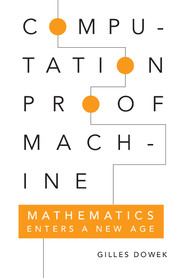Book contents
- Frontmatter
- Dedication
- Contents
- Introduction: In Which Mathematics Sets Out to Conquer New Territories
- PART ONE Ancient Origins
- PART TWO The Age of Reason
- 3 Predicate Logic
- 4 From the Decision Problem to Church's Theorem
- 5 Church's Thesis
- 6 Lambda Calculus, or an Attempt to Reinstate Computation in the Realm of Mathematics
- 7 Constructivity
- 8 Constructive Proofs and Algorithms
- Part Three Crisis of the Axiomatic Method
- Conclusion: As We Near the End of This Mathematical Voyage …
- Biographical Landmarks
- Bibliography
- References
5 - Church's Thesis
from PART TWO - The Age of Reason
Published online by Cambridge University Press: 05 May 2015
- Frontmatter
- Dedication
- Contents
- Introduction: In Which Mathematics Sets Out to Conquer New Territories
- PART ONE Ancient Origins
- PART TWO The Age of Reason
- 3 Predicate Logic
- 4 From the Decision Problem to Church's Theorem
- 5 Church's Thesis
- 6 Lambda Calculus, or an Attempt to Reinstate Computation in the Realm of Mathematics
- 7 Constructivity
- 8 Constructive Proofs and Algorithms
- Part Three Crisis of the Axiomatic Method
- Conclusion: As We Near the End of This Mathematical Voyage …
- Biographical Landmarks
- Bibliography
- References
Summary
the attempt to address Hilbert's decision problem and the negative result it achieved in Church's theorem led mathematicians of the thirties to clarify what an algorithm is. They offered many definitions, among which were the Herbr and–Gödel equations, Church's lambda calculus, Turing machines, Kleene's recursive functions, and rewrite rules. Each of these puts forward a language in which to express algorithms – nowadays, we would say that each defines a “programming language.”
Time has shown these definitions to be equivalent: if an algorithm can be defined in one of these programming languages, that definition can be translated into any of the others. This equivalence of definitions ranks among the greatest successes of computability theory: it means that an absolute concept of computation has been reached independent of the accidental form assumed by this or that algorithmic language.
Yet the mathematicians of the thirties faced an obvious question. Is this it? Is this “the” notion of computation? Or might someone in the future come up with other languages capable of expressing more algorithms? Most mathematicians of the thirties rejected this possibility; to them, the concept of computation, defined by Turing machines or by lambda calculus, was the right one. This thesis is called Church's thesis, although as before several mathematicians – particularly Turing – developed similar ideas.
THE COMMON CONCEPT OF COMPUTATION
Church's thesis asserts the identity of two concepts: the concept of computation as defined by lambda calculus, Turing machines, and so forth and the “common” concept of computation. One of the reasons Church's thesis is so hard to formulate precisely is that it is unclear what the common concept of computation is. Indeed, if you formulate Church's thesis by stating that no algorithmic language that might be put forward in the future will ever be more powerful than those we already know or, in other words, that all the algorithms we may come across in the futurewill be expressible in the languages we use today, you sound more like a fortune-teller looking into a crystal ball than a mathematician formulating a scientific theory.
- Type
- Chapter
- Information
- Computation, Proof, MachineMathematics Enters a New Age, pp. 55 - 68Publisher: Cambridge University PressPrint publication year: 2015



